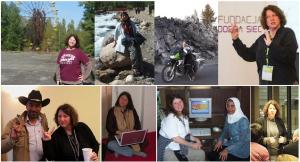You are here
- Home
- Student perspective: Studying the OU MSc in Development Management
Student perspective: Studying the OU MSc in Development Management
12 October 2017

Ever wondered what it is like to study for a postgraduate qualification as a mature student? Jayne Cravens, an international consultant who has just completed an OU MSc in Development Management, shared her experience of studying on her blog. We love her honesty and wanted to share an excerpt below to help anyone else thinking about studying. The key, she says, is choosing a subject that sparks your interest and ignites your passions. Development Management did that for her, and here is an excerpt from her blog post:
“In the Fall of 2002, I went back to formal studies for the first time in more than 14 years. And after three years of studies, and just three months before my 40th birthday, I completed a Master of Science in Development Management from The Open University (OU).
“I had sworn many times, sincerely, that I would never pursue a Master's Degree, unless it could be for something totally fun, engaging, and probably useless.The thought of studying marketing, public relations or non-profit management at a post-graduate level made me cringe – that's all been my job, my life, since before I left university back in the late 1980s, so why in the world would I want to devote even MORE time to it?”
Jayne said that among the things that changed her mind about studying a Masters, was wanting to “break out of middle management”. She continues:
“I like middle management, for the most part – I also like being an individual contributor within an organization. I don't want to get so high in the hierarchy that I don't get to work with the constituency of wherever I'm working. But I decided that I could better-insure that I get a job that I would truly love if I got a Master's in a subject I feel passionate about. Other than history...
“The courses that make up Open University's development management…address the myriad of ways to successfully manage and sustain activities, projects and initiatives in an integrated way so that they really do improve people's lives and their environment, and address critical situations such as HIV/AIDS, violence and discrimination against women, child labor, illiteracy, environmental destruction, hunger, and so forth. It mixes theory with practice, and presents a vast number of authors, practitioners and publications to explore the many facets of development management.
“What was wonderful about studying development management was that the studies are applicable to so many, many professional and personal settings, in any country. No country is fully-developed; development activities still have to be undertaken even in the world's richest country. Many times, when I was asked to apply a principle we were learning about in an OU course to a personal experience, I used my previous volunteer experience in the USA, such as working with American Indians in California, promoting access to technology and tech education for people with disabilities, or advocacy work for reproductive rights groups. It was also great to study development management because, often, I immediately came in contact with information I could use immediately in my work at the United Nations. In fact, I have to say that OU was ahead of the curve in development management thinking, more so that the UN...
“I am more proud of my Master's Degree from OU than I am of anything I've done relating to academics in my life and several of the jobs I've held. I'm especially proud that it came from such an outstanding institution. And the OU materials have, indeed, better prepared me for work in the field, giving me tools I've used in my work, preparing me for current and future trends, and introducing me to the very particular language of development that various agencies use.
“So, my primary advice if you are considering, even barely, a Master's Degree, regardless of which university: don't do it unless you are really excited about doing it. Gauge this by telling people you are considering doing it -- not for their reaction, but for your own. Do you feel excited when you tell them, regardless of their reaction? If not, I say don't do it. If you can't feel passionate about a subject, the only other reason would be if, and only if, you are guaranteed to walk into the job of your dreams with a Master's and, the truth is, there usually isn't such a guarantee. I believe that engaging in activities you love is more important than a high pay. But, of course, to each his own. My secondary advice: be prepared to give up a big chunk of your social life. If you have a family, talk to them about what studying 8-20 hours a week is going to mean to them. Without their support (being quiet while you are studying, respecting your space where you keep your class materials, etc.), you will never make it.
“Time with friends will be sacrificed. Nerves will be stressed. Tears will be shed. But if you will truly make the time and effort, you can do this.”
You can read Jayne’s full post on her blog site, Jayne Cravens and Coyote Communications, and find out more about Jayne at her website Coyote Communications.
Share this page:
Monthly Archive
- March 2024 (1)
- November 2023 (1)
- February 2023 (1)
- January 2023 (1)
- November 2022 (1)
- October 2022 (1)
Contact us
To find out more about our work, or to discuss a potential project, please contact:
International Development Research Office
Faculty of Arts and Social Sciences
The Open University
Walton Hall
Milton Keynes
MK7 6AA
United Kingdom
T: +44 (0)1908 858502
E: international-development-research@open.ac.uk
.jpg)